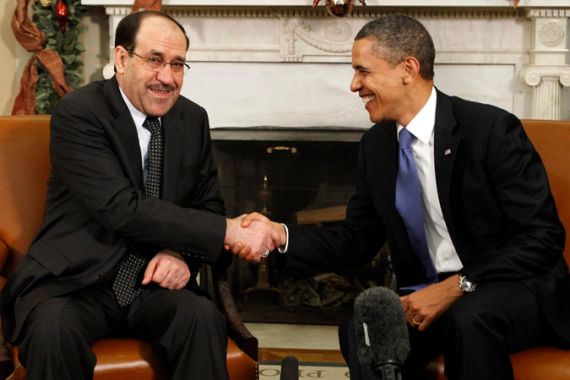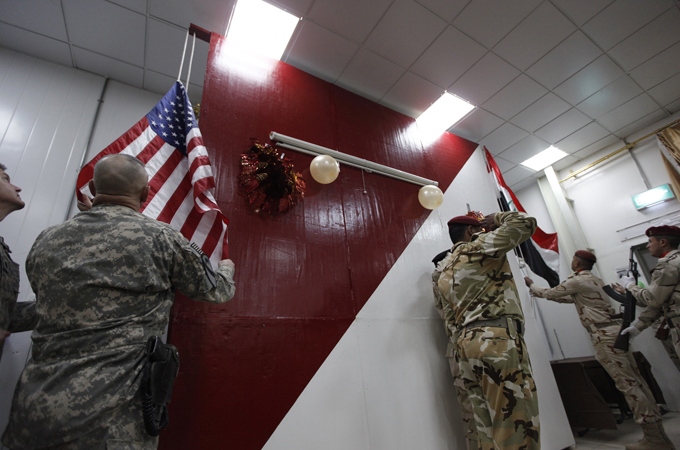Iraqi PM in US to chart future relations
Nouri al-Maliki and Barack Obama discuss post-withdrawal relationship, as NATO announces plans to end its Iraq mission.

 |
| The number of US troops in Iraq has dwindled to 8,000 ahead of a December 31 date for complete withdrawal [Reuters] |
With the US troop withdrawal from Iraq entering its final days, Iraqi Prime Minister Nouri al-Maliki is meeting with President Barack Obama at the White House to discuss the next phase of the relationship between their countries.
The withdrawal of all US troops by December 31 marks the end of an eight-year war that has been deeply divisive in both the US and Iraq.
While Obama and Maliki have pledged to maintain strong ties, the contours of the partnership between Washington and Baghdad remain murky, as serious questions remain about Iraq’s capacity to stabilize both its politics and security.
|
“The North Atlantic Council has decided to undertake the permanent withdrawal of the NATO Training Mission-Iraq personnel from Iraq by 31 December 2011.” – Anders Fogh Rasmussen, NATO secretary general |
The end of the war still marks a promise kept for Obama, one the White House is eager to promote.
Al Jazeera’s Patty Culhane, reporting from Washington, explained that “Obama wants to send the message to American voters, especially in this election year, that he ended the Iraq war”.
Monday’s meeting between the two leaders is expected to focus heavily on how the US and Iraq will continue to co-operate on security issues without the presence of US troops.
Iraqi leaders have said they want the US military to help train their security forces but have been unable to agree on what type of help they would like or what protection they would be willing to give the trainers.
As of late last week, the number of US troops in Iraq had dwindled to about 8,000, down from 170,000 at the war’s peak in 2007.
Obama and Maliki will hold a joint news conference later on Monday, then lay wreaths at Arlington National Cemetery, where many of the nearly 4,500 Americans killed in the Iraq war have been buried.
NATO ends mission
NATO has also announced plans on Monday to end its eight-year mission in Iraq.
“The North Atlantic Council has decided to undertake the permanent withdrawal of the NATO Training Mission-Iraq personnel from Iraq by 31 December 2011,” said Anders Fogh Rasmussen, NATO secretary general.
NATO officials said earlier on Monday that that talks on extending the mission have stalled over the question of legal immunity for foreign trainers – an issue that earlier torpedoed plans to keep a residual US military presence in the country.
NATO has about 130 advisers from 13 member nations and Ukraine in Iraq.
Iran’s influence
Looming over the talks are concerns among US officials over how Iraq’s relationship with Iran will develop with a significantly smaller US presence in the region.
Maliki has insisted that Iraq will chart its future according to its own national interests, not the dictates of Iran or any other country.
| IN VIDEO |
|
US pullout from Iraq continues |
Iraq analyst Ghassan al-Attiya told Al Jazeera that Maliki is trying “to keep an equidistance between Tehran and the United States”.
“Actually he’s proven he’s capable to be the compromise choice for the Iranian and the American. In this sense, he doesn’t want to show himself to be too close to the Iranian or too close to the American,” he added.
But some US officials have suggested that Iranian influence in Iraq would inevitably grow once its troops depart.
Both countries have Shia majorities and are dominated by Shia political groups.
Many Iraqi politicians spent time in exile in Iran under Saddam Hussein’s repressive regime, and one of Maliki’s main allies, anti-US cleric Muqtada al-Sadr, is believed to spend most of his time in Iran.
Washington has warned Iraq’s neighbours that even though its troops are leaving, the US will maintain a significant presence there.
About 16,000 people are working at the US embassy in Baghdad, making it largest US mission around the world.